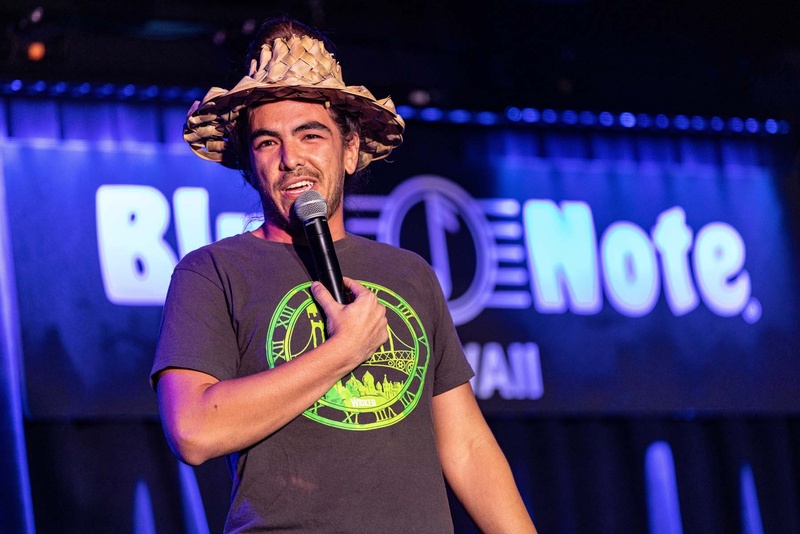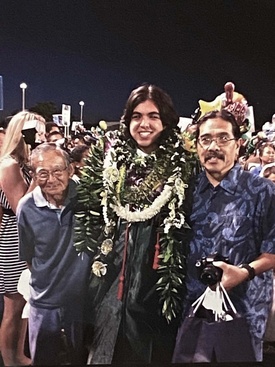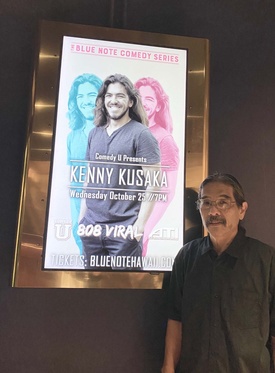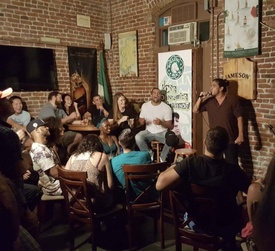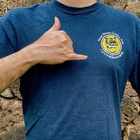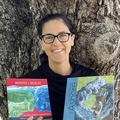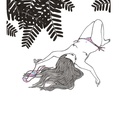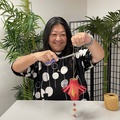Leilehua class of 2013 grad, Kenny Kusaka wuz getting lotta leading roles in da Local theatre scene in Hawai‘i when he decided for switch gears and try his hand at stand-up comedy. For da past several years he been making one name for himself on top da stand-up circuit, refining his act all across da country. I caught up with him recently aftah his first time headlining his own show at The Blue Note, da Hawai‘i branch of da celebrated New York entertainment venue.
* * * * *
Kenny, what your fondest memory of growing up in Wahiawa on O‘ahu?
Hmm. (Ponders for forevah and a day.)
How come you tinking for so long!?
Brah, Wahiawa is boring to death! (Laughing) We never have nothing, you know. By the time I grew up, we didn’t have a bowling alley, no movie theater over there. So I’m gonna say my fondest memory was Dad would just load us all into the back of his pickup truck, and we would go Chun’s Reef, Leftovers, and all the North Shore beaches on weekends.
(Laughing) So your fondest memories of growing up in Wahiawa is da weekends when you got for LEAVE Wahiawa?
(Laughs) Yes.
What your ethnic backgrounds?
Half Japanese on Dad’s side and a quarter Italian, an eighth Irish, and an eighth German on Mom’s side.
How you identify? Nikkei, Japanese American, Local, Local Japanese, Hapa?
I will say probably first and foremost I identify as a Local person, Hawai‘i born and raised. And then secondly as Local Japanese and then probably thirdly as Japanese American.
When you first knew you wuz funny?
My mom likes to tell this story. In sixth grade, I had just finished my first year at Wahiawa Middle School and I spoke at the new student orientation. I remember I made some jokes like we had a band, so I was like, “Give it up for the band. I’m not actually with them, but they did an amazing job!” And everybody was laughing and applauding and that was the first time that I was like, oh, I’m kind of funny.
Who are you grateful to for supporting you on your stand-up comedy journey?
Man. I’m torn between Dad and Grandpa, so I’m gonna say the Kusaka family men. My dad, Russell Kusaka is a public high school teacher down at Waialua and his whole motto for life is selfless servitude to others. I think from the time I was a little kid, I’ve gotten to watch him always bend over backwards to help other people. And my grandpa, Kenneth Kusaka was the same way. He really was involved in raising me and my sister Carina. He really made it his mission to be helpful to others. He was always bringing buckets of pineapple and mango to all of the neighbors and rolling in their trash cans, just finding ways to be of service.
I not seeing da connection. You can try explain how stand-up comedy is like servitude?
Well, there’s so many different parts to comedy. Of course, there’s the oh, everybody’s giving me attention, it makes me feel really good part, but there’s also a part beyond that where it’s really a service-based thing. It’s a way to see somebody else’s experience on Earth. It’s how people learn about each other. It’s how people think differently. It’s how they challenge their preconceived notions of the world and of society. So I think of comedy as my way of contributing.
I mean my grandfather and my dad were always the first to say, you have to help other people, you have to include other people and make sure they feel included. So for me, a lot of what I try to do with comedy is I give a voice to people that are excluded by society or are on the margins. I think that traditionally comedy has been from a very White American perspective. So I have a lot of fun with trying to diversify that and add perspectives from the Local Hawai‘i experience or the Local Japanese experience.
I know you wuz one theatre actor before. In fact you wuz even da lead in UchinaAloha, one play I wrote. Aftah dat I know you had oddah lead roles too, so how come you wen switch to stand-up comedy?
I think through doing plays I fell in love with the performing and also I became very curious about what it would be like to sort of write with my own voice. Through doing your play and a lot of Kumu Kahua Theatre plays, and Lisa Matsumoto plays, that’s really what inspired me to become more of an advocate for Local [identity] and especially Pidgin culture. I loved being a part of the representation that was bringing that to the stage and there was a part of me that felt like I wonder if I could say some things like that using my own words.
Try describe your brand of stand-up.
I would say that my style is Hawai‘i Tour Guiding for Dummies. I’ve earned my money over the past ten years through various jobs in the tourism industry like private tour guiding and working on dolphin snorkeling boats. So a lot of my stand-up pulls from firsthand experiences in that area. I talk about the different types of tourists that I’ve met and the outrageous things that tourists would say to me like, “Oh, I hope you guys become a state one day.” So I like to give a little bit of the Local perspective on that.
You wen just headline at The Blue Note in Hawai‘i. Try talk about dis experience.
So I’ve been doing stand-up now for about seven years and that’s been kind of the goal you know. When you’re first starting, you’re just sort of throwing everything at the wall to see what sticks and then gradually you get better. And then maybe a few years in you have maybe five minutes that makes people laugh consistently. And then you go for another few years until you get ten minutes. And then you start to do bigger shows where all of a sudden you go from performing for free to now people are paying twenty bucks to see you.
So it’s this very gradual, long set of stairs. So to be given forty-five minutes all to myself at a really iconic stage like The Blue Note was a really, really big opportunity. But it was also a lot of pressure because it was the first time that it was my face and my name on the line. Now that it’s done, I’m already looking at what can I improve for the next time.
Wuz dis da best show you eva had?
You know, The Blue Note was great, but the one show that was the most fun time I ever had was when I got to play the Hawai‘i Theatre earlier this year. I opened for a bigger comic celebrity, Steve O. He was from a TV show called Jackass that ran in the early 2000’s and he invited me to be his opening act. This was the first time I played that theatre. There were 1,100 people there and it was crazy. The theatre was so big that when I told a joke, I could hear the waves of laughter coming down on me from the balcony. It was just a feeling of WHOA. Like seven years of grinding at dive bars and open mics had finally paid off.
What place you had da roughest audience and what lesson did you learn from that experience?
So I’ve performed obviously in Hawai‘i, but I’ve also done a lot of West Coast states. I’ve done like Washington, Oregon, California, and then I’ve also been to New York. New York was probably the most challenging. And I think the big difference for me is that in Hawai‘i, we have the aloha spirit, right. We’re gonna give everybody chance and that even extends to comedy. If you’re up there for ten minutes, even if you’re not doing great in Hawai‘i, people will still be nice. In New York, it’s the total opposite. If you’re not crushing in the first minute, people will boo! In New York, I learned that by bombing in front of audience, after audience, after audience, it helped me improve my material because I no longer had that safety net of people who wanted me to succeed.
In your travels have you encountered a lotta Japanese American comedians out dea?
No, hardly any and I think a big part of it is that a lot of times in Japanese culture we are concerned with what other people will think. And it’s a big obstacle with Japanese Americans doing stand-up comedy because I’ve thought those things! I’ll think of something funny and take it up on stage and then inside I feel almost shame, like I hope my dad guys don’t ever hear me saying what I’m saying.
Try tell one Japanese American joke that you used before in one set.
I’ve recently been experimenting with this one about politeness. I’m Japanese. And Japanese Americans, we’re very polite. We’ll apologize for anything. We’ll apologize for everything... except all of the things we did in World War II. We’re not going to talk about that. That’s strictly off limits and anytime historians almost remember and say, “Hey, didn’t you guys commit a bunch of war crimes in Nanjing and Korea?” that’s when we release a new batch of Pokémon games. That’s the release cycle. We have to make everyone fall in love with us to make them forget all that other stuff.
(Laughing) How you modify your set depending on where you stay?
At home I feel a lot more free. I can just say I’m Japanese from Wahiawa and an audience will know exactly what that means. But on the mainland it just requires so much more explanation. I would have to say I’m a Japanese American and that means I’m not from Japan. I was born and raised in a city called Wahiawa out in Hawai‘i. That doesn’t make me Hawaiian, you know. When I’m performing on the mainland, I always have to catch myself and remember to make it accessible for people.
Das funny. So your one minute joke here in Hawai‘i might take five minutes on top da continent.
(Laughing) Exactly.
Back in da day da goal of a lotta stand-ups wuz for get recognized den have their own television sit-com. Is that one dream of yours? What might da Kenny Kusaka Show be about? Pitch me da show right now!
Yeah, I would love to have a show! I think it would be really interesting to chronicle my adventures as a tour bus guide. When I first started out I didn’t see how there’s a lot of inequalities between social classes, between races of people. Ultimately, I left the tour guiding industry because I felt that it was taking too much of Hawai‘i’s aloha, and it was commercializing it instead of truly teaching people about Hawai‘i. I felt like in the end I was being exploited. So yeah... that would be my sit-com. (Laughing).
What does da future hold for Kenny Kusaka?
I really want to try to record my material and start pitching it to different companies on the mainland and hopefully make something happen. The next step is getting either an Amazon, Netflix, or HBO special. Whether [my big break] will happen in the next six months or the next twenty years, I don’t know. But for now at least I have a good chunk of material that I know I’m very proud of.
© 2023 Lee A. Tonouchi


